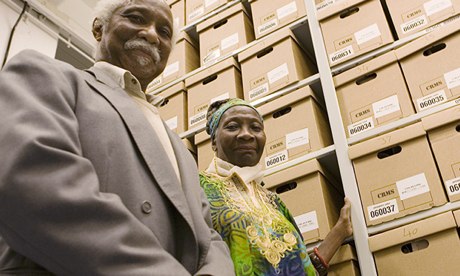
In the late 1960s the activist and publisher Jessica Huntley, who has died aged 86, co-founded the pioneering, London-based Bogle-L'Ouverture Publications (BLP) with her husband, Eric Huntley. Named in honour of two heroes of Caribbean resistance, Toussaint L'Ouverture and Paul Bogle, and deeply rooted in the concerns of the African diaspora, BLP began as a small, unorthodox, self-financing venture that brought a radical perspective to non-fiction, fiction, poetry and children's books. The company went on to publish works by a growing list of notable authors, among them Andrew Salkey, Linton Kwesi Johnson,] Lemn Sissay and Valerie Bloom.
Before arriving in Britain the Huntleys had served an apprenticeship in the politics of Guyana in the 1950s. Born in Bagotstown in what was then British Guiana, Jessica was the youngest of five children of Hectorine (known as "Aunt") and James Carroll. Auspiciously, her birthday of 23 February is also commemorated as the start of the 1763 Berbice Slave Uprising, a key event in Guyanese liberation history.
Jessica's father died when she was three, and her mother strove to mitigate the hardship of living in a tenement yard in Charlestown, Georgetown, instilling the values of independence, discipline, justice and loyalty that informed Jessica's life. Unable to finish high school on the family's meagre finances, Jessica attended evening classes in shorthand and typing. With the hope of a clerical position becoming available, she worked in a garment factory, where she took up the cause of exploited female workers.
In 1948 she met Eric, a postal worker active in the trade unions. They married in 1950 and their sons, Karl (named after Marx) and Chauncey, were born in the subsequent two years. The marriage was underpinned by political involvement, whether in the village of Buxton, where they initially lived, or at a national level. Eric was a founding member of the People's Progressive party (PPP), which came to government in the country's first elections based on universal adult suffrage in April 1953.
In May that year Jessica co-founded the Women's Progressive Organisation to represent women's issues in the PPP's fight for national liberation. However, in October 1953 the colonial British government suspended the constitution and instituted a state of emergency. Eric, like other PPP members, was arrested for a minor misdemeanour and imprisoned for a year.
After Eric had made his way to Britain in 1957 with the intention of studying to increase his work prospects, Jessica became organising secretary of the PPP and was persuaded to stand as a candidate for election. Her defeat, despite popular backing, freed her to join her husband in England, where she arrived in April 1958, leaving her sons in care of Aunt. It took years of saving before the couple could afford to have their children rejoin them in 1962. At one time, in 1964, they were grateful tenants in the north London home of the Trinidadian cultural activist John La Rose, who in 1966 established the UK's first black publishing company, New Beacon Books, and remained a friend.
The Huntleys eventually settled in a west London flat that served as a venue for political meetings as well as a home for their family, which had expanded with their daughter, Accabre (named after one of the rebels in the 18th-century Berbice revolt).
When, in October 1968, the Guyanese radical historian Walter Rodney was banned from re-entering Jamaica to resume his post at the University of the West Indies, after attending a conference in Canada, the Huntleys were among those who mobilised support in the UK. Rodney's The Groundings With My Brothers (1969) was the first title to be published by BLP, which also published his influential work How Europe Underdeveloped Africa (1972).
The Huntleys relocated to west Ealing in 1972, their front room functioning as office and trade-counter until the council objected. A vacant site in a local cul-de-sac was instead set up as a bookshop, and – despite racist attacks on the building by the National Front – remained open for 18 years, renamed the Walter Rodney Bookshop in 1980 after his assassination. The bookshop became an informal drop-in advice centre and hosted poetry readings, book launches and schools workshops.
For more than a half-century Jessica participated in many grassroots struggles for racial and social justice; the Huntley papers, donated to London Metropolitan Archives, are a testament to the range of their concerns and activities. She was closely associated with community initiatives such as the Black Parents Movement, which campaigned against the controversial "sus" laws that allowed police to stop and search anyone on the suspicion of intent to commit an offence – with black youths believed to be particularly targeted; the Caribbean Parents Group; the New Cross Massacre Action Committee, which organised the largest-ever protest march of black Britons in the wake of the deaths of 13 young black people in a fire in south-east London in 1981; and the Keskidee Centre, Britain's first Afro-Caribbean cultural centre.
The International Book Fair of Radical Black and Third World Books was inaugurated in 1982 with Jessica as joint director alongside La Rose. Collaboration between the few black-led publishers came naturally. Having co-founded Allison & Busby in 1967, I met Jessica and we worked together on campaigns to diversify the wider industry. Beyond that, we enjoyed an enduring friendship, characterised by warmth and laughter. Despite some recent health problems, she never seemed inclined to retire from publishing (Luke Daniels's Pulling the Punches: Defeating Domestic Violence came out in 2010, Richard Hart's Caribbean Workers' Struggles in 2012) and her dedicated attendance at community events was inspirational.
She is survived by Eric, Chauncey, Accabre, six grandchildren and six great-grandchildren. Karl died in 2011.
• Jessica Elleisse Huntley, publisher and activist, born 23 February 1927; died 13 October 2013
